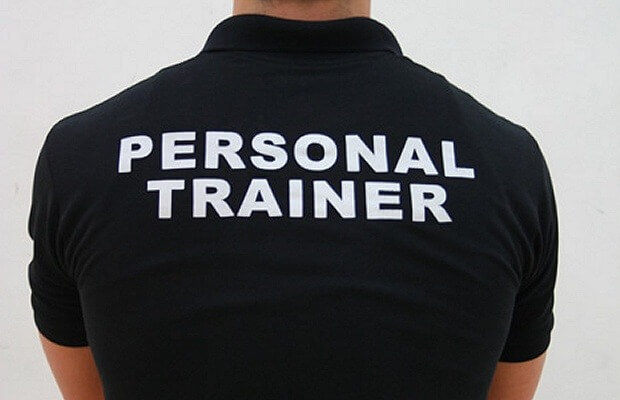We can all use a bit of help from time to time, right? From programming that new Smart thermostat to filing taxes, a bit of assistance now and again really is helpful (even if we don’t always want to admit we can’t figure out something).
The same is true when you hit the nearest gym. The fact of the matter is, when you walk into the gym, you’d be surprised as to how many people really don’t know what they are doing.
Even the seemingly self-explanatory machines have people perplexed. You’ve probably seen YouTube videos of people doing who knows what on the most obvious machines.
Some of the videos are pretty funny, we’ll admit, but it’s only funny when nobody gets hurt. And let’s face it. If they knew how to do it right they would.
How To Find A Good Fitness Trainer
A good fitness trainer is on hand to not only make sure you do the best moves correctly, but they help you design a workout plan online & in the gym. They can provide that little bit of extra motivation you need to push you over the edge. Just don’t settle for any fitness trainer though. This is a good way to end up overpaying for something that doesn’t work for you.
Instead, read up on these different tips and suggestions for finding the right fitness trainer.
All Fitness Trainers Created Equal, Right?
This is like saying all pizza is created equal.
No, all trainers are not created equal.
In fact, there are some really, really bad ones out there who are just going to leave you injured or not improving the ways you want to improve. Just because a gym sets you up with a “personal trainer” or you find someone online who offers “fitness tips,” doesn’t mean they know what they are talking about or are properly trained.
Flipping through a few workout magazines and maybe sifting through an eBook on the muscular system and human anatomy doesn’t make someone a personal trainer.
You won’t go to a doctor without a license but did read the introduction to a pre-med book, would you?
Of course not. Not all trainers are created equal, so you need to know how to find the right trainer for you.
How to Spot the Bad Ones
Let’s start with the obvious signs here. First, the most likely place you’ll connect with a trainer is at the gym.
Perhaps you just joined a gym and they “offer” a few free training periods with a trainer.
Sounds good, and after all, it’s free, right?
Well, they are using the same kind of bait and hook tactic that drug dealers have been using since the beginning of time (first hit is free…and then the price is jacked up after that).
Before you agree to that free personal trainer session, ask for credentials. If they are not, at the very least, a certified trainer, pass right away and never look back. There are different levels of certification and if they can’t even have one, they are not worth your time.
Yes, some resumes will look nice.
Maybe one guy played football at Arizona State, or a lady was the captain of the lacrosse team in New Hampshire.
All of that is great, but that doesn’t mean they know the inner workings of the body and how to improve specific areas of the body while reducing injury potential. You wouldn’t go with an electrician who isn’t certified, so don’t go with someone who’s working with your body that isn’t either. So no matter how “impressive” the resume might look, if they are not certified, don’t sign up.
If they do have the necessary credentials, what is their experience level?
Are they just starting off or have they been practicing for years?
This one is a bit up to you. It’s not to say someone who just recently became certified isn’t good, but they don’t have all the experience of seeing results and developing specific programs. If you’re tight on funds, going with a new trainer might fit your pocketbook better as they (should) cost less. Just keep this in mind.
Internet Trainers
You’ll find all sorts of workout videos on YouTube. If you want someone to lead you through a cardio session go right ahead. But when it comes to lifting weights and training your body, don’t just use anyone. There are all sorts of videos of ripped and muscular guys giving lifting advice. The problem here is not everyone is the same.
Their body is different from yours, so unless they have knowledge and science to back it up, these videos might end up with you injuring yourself.
It’s always better to go with an in-person personal trainer. But if you like working out at home and want some specific tips, make sure to research the individuals and find out if they are actually personal trainers in real life with the necessary degrees or certifications.
What Certifications Should You Look For
Alright, so you’re at the gym and you’re going through the list of available trainers.
What kind of certifications should you look for?
Well, there are a few. You want to see a certification from the American Council on Exercise (ACE), the National Strength and Conditioning Association (NSCA) or the National Academy of Sports Medicine (NASM).
Now, those are just the certifications for trainers.
If you really want someone who can provide the very best in personalized care, especially if you’re coming back from an injury, look for someone with a degree in physical therapy. These individuals will have additional education and training on strengthening the body and repairing injuries.
These individuals often are able to adapt to unique circumstances as well.
Cater to Your Needs?
So you’ve found a few different trainers who check off the certification boxes and fit your own experience requirements.
That’s great.
Now’s the time to test them out. You don’t need to stay with them after the first session, so make sure you take notice of how they work with you.
First, they should ask what your personal goals are and begin to create a specific workout plan to meet these needs. Someone who wants to grow their booty versus someone who wants to power up their chest or just drop weight will all have different workout focuses and needs. Be mindful of the instructions initially and ask plenty of questions.
If the workouts are not made specifically for you and what you want to accomplish, it means the trainer just gives a generic workout to everyone. They may have just printed something off from the Internet and are now using it on you. You are paying them for their services, so if they do not adapt to what you need, it’s time to move onto the next one (CNN, 2013).
Philosophies and Specialties
This fits right in with catering to your needs, but there is enough specific information we wanted to create a separate section. When first talking with a potential trainer, ask what their philosophy of training is.
A personal trainer, especially one who has been around for a while, should have a unique philosophy.
Do they prefer to stay in the gym or would they rather exercise outside, in real work situations?
Are they machine oriented or would they rather go with free weights?
What kinds of cardio do they believe works best and why?
The philosophy is important to know as it shows they have fine-tuned and crafted personal training routines based on what they specifically believe in.
There is a reason why major sports teams (and major college sports programs) pay big bucks for trainers. These trainers are paid off of their success, which usually means improved strength and reduced injuries. Basically, they are paid for their philosophy. If a trainer is unable to answer this question, you need to make a hard pass on their services.
Beyond their philosophy, what are their specialties?
In other words, do they specialize in endurance training, improving body strength while not bulking up, in powerlifting or in something else?
Don’t fall for the “jack of all trades” line.
How often have you been to a restaurant that sells everything, but nothing is great?
Probably far too many times. You just can’t specialize in everything, because then you don’t have time to master anything. The trainer’s resume should clearly indicate what they specialize in. If it doesn’t, ask before saying what you want to accomplish. This way, they do not tailor their response to what they believe you’re looking for. This is why you need to know what your goals prior to booking a trainer (WebMD, 2018).
Are Your Personalities Compatible?
Alright, so you’re not going to ask your personal trainer out on a date after working up a sweat (well, you could, that’s completely up to you).
However, it is important for your personalities, at least training personalities, to work together.
It is up to the trainer to find ways to motivate you. Different people respond to different forms of motivation. There are some people who respond to a trainer who yells at them, while there are others who are completely turned off by that. On the other hand, you might respond to helpful, friendly lines of motivation.
You know yourself. What do you respond to?
Would a Rocky Balboa-like trainer who pushes you and pushes your order to extract every single ounce of performance work better for you?
Or would someone like Rob Lowe’s character from Parks And Recs work better for you because their motivational and friendly tone inspires you to do more?
It might take a few sessions with a particular trainer to figure this out, but if they are not able to motivate you, find a different trainer who can.
What’s This Going to Cost?
A good trainer can cost a good amount of money.
After all, they are spending 100% of the time allotted on you and only you. There’s a reason why highly skilled hair stylists cost more than the Super Cuts joint down the street, or why an experienced attorney can charge $500 an hour when someone out of law school might charge $150. You often pay for what you get, and as you’re dealing with your body, you want someone who knows what they are doing.
So, find out what it will cost you, and then decide if you can even afford it.
There’s really no point in signing up with a personal trainer when you know you can only afford a few sessions. Over time, you can reduce the number of times you see them once you fall into a routine. Just make sure you can afford to get there.
Is There Progress?
Lastly, the final step in finding the right trainer is do you see progress?
Of course, are you listening to them and following both their training and dieting plan?
If you are and you are not demonstrating progress, are they tinkering and adjusting the plan to correct this, or are they sticking it through with the same routine?
What’s the point of paying an hourly rate if you’re not going to see results?
You wouldn’t go to the dentist and pay to just sit in the chair, would you (and no, you don’t have access to the laughing gas)? So if you’re not seeing results, consider shopping around for a new trainer (Telegraph, 2017).
Conclusion
Having a good fitness trainer by your side is a great way to take your workouts to the next level. Even the greatest athletes in the world rely on fitness trainers to point out flaws and create personalized workout routines to improve performance.
You might not be the next great wide receiver, point guard or striker, but you can be the next great version of yourself.
So if you want to reach these new goals and believe you may need a bit of assistance, now is the time to find yourself the right fitness trainer.
-Terry Asher
Terry Asher
Latest posts by Terry Asher (see all)
- Better Family – Product Review Liquid Daily 2 oz - Dec 16, 2024
- Post-Workout Recovery: The Key to Optimal Performance - Nov 25, 2024
- Pre-Workout Supplements – Everything You Need To Know - Nov 18, 2024















[…] via- https://gymjunkies.com/fitness-trainer/ […]
I think you hit it right on the head including the correct personal trainer certifications to look for. I know there are a lot of rubbish ones out there.
I absolutely love Gym Junkies!! there is always great content for health and fitness. I found an amazing way to trim down even more, visit https://tinyurl.com/yyvpl7kc there is some helpful tips and tricks to get lean.
I like how you mentioned that I should evaluate whether the trainer I’m looking for is machine-oriented or not. One of the things that made me not that into getting into going to the gym is using workout machines that feel a bit complicated. I think my preferred fitness trainer would be someone that would rather exercise outside. I think I would be more motivated with that.
[…] you’re going to learn on the internet is going to be fairly general advice. What you get from a trainer is going to be personalized and specific to your body type and your fitness […]
[…] you’re going to learn on the internet is going to be fairly general advice. What you get from a trainer is going to be personalized and specific to your body type and your fitness […]
[…] you’re going to learn on the internet is going to be fairly general advice. What you get from a trainer is going to be personalized and specific to your body type and your fitness […]
[…] you’re going to learn on the internet is going to be fairly general advice. What you get from a trainer is going to be personalized and specific to your body type and your fitness […]
Thanks for pointing out that compatibility in personalities is also important to maintain when looking for a sports trainer. I’ve been thinking about taking up badminton soon because it seems like a good sport that’s easy to learn on a casual level yet can be very challenging competitively. That kind of sports would probably a great hobby for me to take up while trying to stay fit.
[…] wouldn’t feel so alarmed and worried during the day after doing a little physical training In the morning. But there’s such a thing as the internal clock, which you have to focus on to […]
[…] wouldn’t feel so alarmed and worried during the day after doing some fitness training in the morning. But there is such a thing as your internal clock, which you should focus on to […]
[…] wouldn’t feel so alarmed and worried during the day after doing some fitness training in the morning. But there is such a thing as your internal clock, which you should focus on to […]
[…] wouldn’t feel so alarmed and worried during the day after doing some fitness training in the morning. But there is such a thing as your internal clock, which you should focus on to […]
[…] wouldn’t feel so alarmed and worried during the day after doing some fitness training in the morning. But there is such a thing as your internal clock, which you should focus on to […]
Thanks for the reminder that I should also consider the philosophy of a personal fitness training coach when looking for the right one. I plan to find a good one soon because I’m interested in looking for a good way to make it easier to lose my belly fat. I think I will need to deal with that first before I start thinking about building up my muscles.